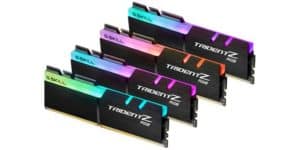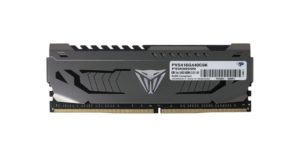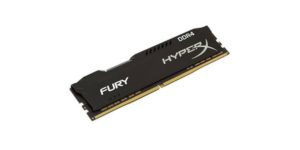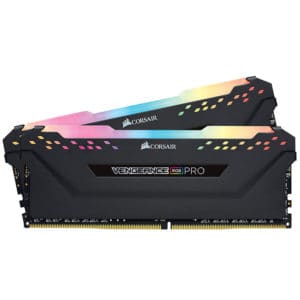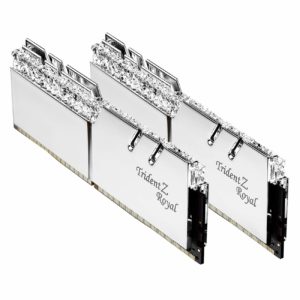Best RAM For Ryzen – 5 Best Options For 2024
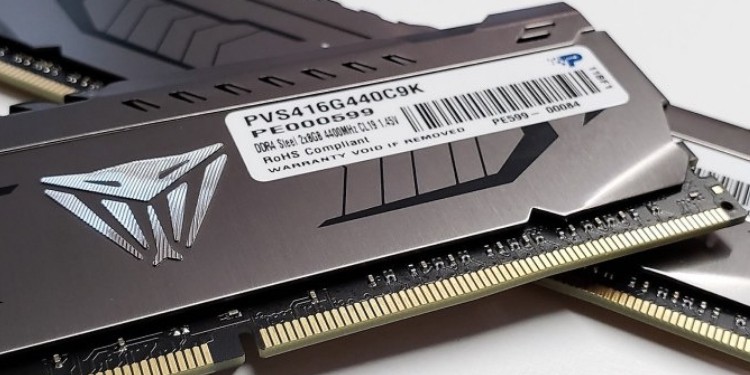
Table of Contents
In this article, we’ll find the best RAM for Ryzen. Specifically, we’ll be going over our five top picks, each best for a different budget and tier of Ryzen processor. The best DDR4 RAM for Ryzen will depend on exactly what Ryzen processor you’re pairing it with, but in general you want to get the fastest dual-channel RAM that you possibly can for ideal performance with your Ryzen processor.
If any of the jargon confuses you, or you aren’t even sure why Ryzen RAM gets its own article, read on. We’ll explain everything you need to know, and hopefully help you choose the right RAM kit for you.
If you’ve picked up a new Ryzen 5000 series CPU and are looking for the absolute best RAM for that specific series, head here where we have all the top picks for you.
Products at a Glance
Product Reviews
- The best speed
- Great reputation with Ryzen CPUs
- Great RGB effects
- High price
- Low availability
This is one of the best Ryzen-optimized RAM kits, and it’s pretty much guaranteed that you’ll land a Samsung B-Die with this particular kit. This G.Skill TridentZ RAM is optimized to run at up to 3600 MHz with a CAS latency of 17, and thanks to the B-Die we know it has it’ll almost certainly play nicely with Ryzen CPUs.
The fast speed, plus the confirmed B-Die, plus the RGB… makes this our pick for best Ryzen-optimized RAM, provided you can afford it. Or that it’s even available, which it often is not. Even if these requirements aren’t met, however, we’re pretty confident that our above recommendations will also provide a great experience on Ryzen, especially the ones from G.Skill and Corsair.
The only real issue we have with it is availability, though even third-party sellers are selling for about ~$170 at the time of writing, which isn’t a bad price at all for this kit.
- Superb speed
- Well-suited for Ryzen 7 and Threadripper builds
- Low CAS latency
The Patriot Viper Steel Series is a favorite among enthusiasts, and this is actually our first truly high-end selection. There’s 16GB of RAM here for roughly ~$150, but cutting that price in half, you’d still be getting 8GB of incredibly fast, low-latency RAM for only $75.
While the 4133 MHz rate is likely beyond what you could reach with a Ryzen processor, this means it’s more or less guaranteed to run well in the ~3600 MHz range that Ryzen is known to reach, and it has a lower CAS latency.
The price is a bit of a bitter pill for this one, but it’s more than fair for what you’re getting in return.
- Lowest price
- Decent bump over basic DDR4 speeds
- Ideal for budget Ryzen systems
- Decent OC success rate
- May not be fast enough for APUs
The HyperX Kingston Fury RAM kit is one of our favorite budget RAM kits thanks to its decently-boosted RAM speeds and low price. It has a heatsink for added overclocking utility, and some users have even reported pushing it as high as 3000 MHz, which definitely can’t be complained about at this price point.
Our only issue with it is that it may not be ideal for Ryzen APU builds, especially the higher-end APUs. (Ryzen 3 2200G might be okay.) We’ll explain how this works in more detail in the buying guide, but if you’re buying an APU build with the intent to actually use its integrated graphics, we recommend bumping up to our #2 pick so you aren’t bottlenecked by RAM speed.
For non-APU builds, though, this should be a perfect companion for Ryzen 3 and Ryzen 5 CPUs.
- Superb speed
- Great RGB effects
- Great reputation with Ryzen CPUs
- High Price
This is going to be our first…controversial pick. So, we’ll get the disclaimer out of the way first: these are a bit overpriced. There is no reason for these to cost more than the others, especially since they’re slower, but that comes with the territory of RGB. If you want to fix that “slower” point and keep RGB, you can…but be prepared to pay for it.
However, Corsair’s RGB products are easily among the best in the industry, and they should work well with full-system RGB setups. Corsair’s Vengeance line is known to perform well with Ryzen CPUs, in general, so we’re still happy to recommend this RAM kit…even if it does come at a little bit of a price premium.
- Will certainly stand out in your build
- Great CAS latency for speed
- Great reputation for Ryzen CPUs
- Expensive
- Probably looks ridiculous
The is the ram that any rapper building his own PC would go for. Without a doubt. We have picked the silver version here, but yes it also comes in gold (google it!)
The G.Skill TridentZ series is a particular favorite among Ryzen enthusiasts, since they have a higher chance of using Samsung B-Dies. (We’ll explain why this matters in the buying guide below.)
Even without that, though, these TridentZ RAM sticks are rated to reach up to 3200 MHz, good for any Ryzen build, but especially good for a Ryzen APU build. Set aside 2GB or so for the iGPU and you’ll be in business for a surprisingly strong 1080p gaming experience, even with some modern AAA games.
The CAS Latency is well-balanced with the 3200 MHz speed here, so that shouldn’t cause any problems, either.
If you are the kind of hobbyist that likes their builds to match beautifully though, good luck finding a GPU and mobo to match with these bad boys!
What should I be looking for?
In this section, we’ll answer common questions and fill you in on what you need to know, just in case you’re confused.
To make a few basic things clear about the spec listings, though:
- Capacity – More is better, but 8GB is perfect for common use and modern gaming scenarios. Larger capacities are best for Ryzen’s APUs or more intensive tasks, like video editing.
- Standard – The current generation of RAM being used, which will always be DDR4 when using Ryzen since DDR3 had largely been phased out by the time it released. (Until DDR5 and compatible motherboards launch.)
- Speed – Higher is better, especially for Ryzen. We’ll explain both of those points below.
- CAS Latency – Lower is better, but this inevitably raises with speed.
What makes RAM any different for Ryzen?
Ryzen CPUs have some design quirks that set them apart from Intel CPUs. It’s been demonstrated through several tests at different times that higher RAM speed gives Ryzen CPUs a more noticeable bump in performance than Intel CPUs. This makes RAM an especially important purchase for a Ryzen build, doubly so if it’s a Ryzen APU build.
Why do Ryzen APUs need fast, dual-channel RAM
Ryzen APUs like the Ryzen 5 2400G contain both Ryzen CPU cores and Vega GPU cores. The CPU and integrated GPU have to share resources, though, and that includes the RAM installed in your system.
Discrete GPUs have the advantage of dedicated VRAM, usually at the GDDR5 grade or better. Not only is this memory faster, but it’s tailored specifically for use with graphics processors, whereas non-G DDR memory is not.
To get the optimal performance with a Ryzen APU, you need at least a dual-channel configuration (so it runs at full DDR4 speed instead of half speed) and 3200 MHz of speed.
Is Ryzen RAM compatibility any different?
Not… really, but some people have favorites. Since Ryzen CPUs seem to be more RAM-dependent than Intel CPUs, they benefit across-the-board from higher speeds and lower latency. This makes them particularly sensitive to low-speed, high-latency RAM kits in a way that Intel usually isn’t.
One of the ways enthusiasts like to choose Ryzen RAM is through selecting kits that use Samsung B-Dies, since those are of a consistently high quality. Of course, getting RAM that fits this criterion can be tricky since it’s unpredictable as to whether or not Samsung B-Dies were used– and you can only test it once you receive it (that’s why the Trident Z is so noteworthy).
Of course, this isn’t actually necessary for getting good RAM with Ryzen, but it does make G.Skill and Corsair great brands to buy from in this category.
Why does RAM speed matter in general?
By and large, RAM speed doesn’t do very much to improve average FPS. The actual benefits, even with Intel CPUs, are found to be in FPS minimums and lows, which increase with higher RAM speeds. Any game will experience occasional FPS drops, sometimes minor, sometimes severe. With a faster RAM speed, these drops can be better alleviated to the point where they are less noticeable or not noticeable at all.
Since Ryzen is more susceptible to slower RAM, these points matter even more for AMD users.
Can Ryzen even push RAM to these higher speeds?
At 4000 MHz and above, probably not. Around the 3600 MHz range, reaching that speed is pretty much guaranteed, as long as the kit in question is able to reach it.
There’s still a benefit to buying faster RAM in this case, though, since it increases the chance of you getting high-quality dies that won’t cause issues with Ryzen. (ie, Corsair and G.Skill using a lot of Samsung B-Dies.) We believe we’ve done our due diligence in researching our picks for this purpose, but feel free to leave a comment below if you feel like we’ve made a mistake.
Our Verdict
As we have mentioned the Tridentz are the best Ryzen-optimized ram and come complete with the RGB blind you might be looking for. It is an expensive kit, but in terms of speed and reputation, there is no way we could recommend anything else, as long as it is in your budget. However, to be fair, any of the Ram here will make a difference to your system. They are all great components that bring various things to the AMD party.
